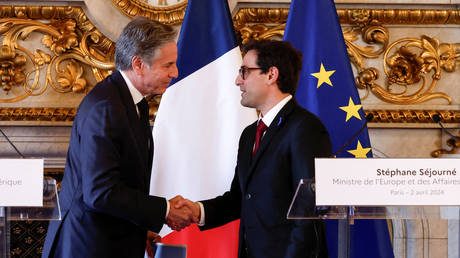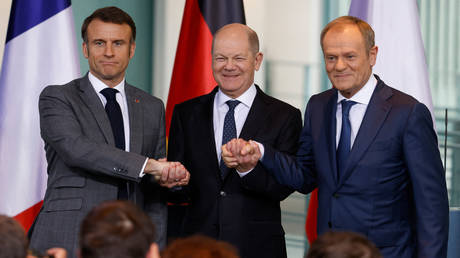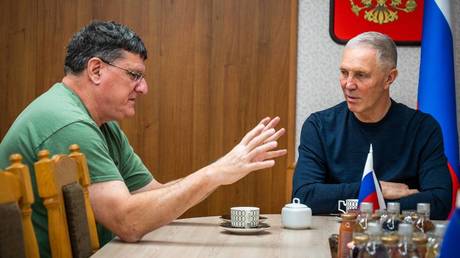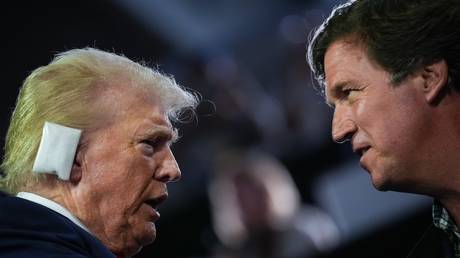ARTICLE AD BOX
The idea of some form of compromise solution to Kiev-Moscow conflict is creeping up on foreign hawks and on more and more locals
What a small band of objective-though-long-disparaged observers in the West have long warned about is now happening: Ukraine and the West are losing their war against Russia. The strategy of using Ukraine to either isolate and slowly suffocate Russia or to defeat and degrade it in a proxy war is coming to its predictable catastrophic end.
This reality is now being acknowledged even by key media and high officials that used to be uncompromising about pursuing the extremely ill-advised aim of military victory over Russia. A Washington Post article has explained that with ”no way out of a worsening war,” Ukrainian President Zelensky’s options ”look bad or worse.” NATO General Secretary Jens Stoltenberg has discovered the option of ending wars by concessions – Ukraine’s concessions, that is. The sturdy old hardliner Edward Luttwak warns of a ”catastrophic defeat” – for the West and Ukraine. True, Luttwak is still spreading desperate illusions about a direct NATO deployment to avert the worst. In reality, it would, of course, only make things much, much worse again, as in World War III worse. But his fear, not to say panic, is palpable.
The fast-approaching outcome will be a disaster for Ukraine, even if Moscow should be generous regarding the terms of a postwar settlement (not a given, after the costs that Russia has incurred). Ukraine has already been ruined in terms of its demography, territory, economy, and, last but not least, political future. The damage incurred cannot simply be undone and will have long-lasting consequences.
For the West, this war will also mark a dismal turning point, in four main ways that can only be sketched here:
First, the US will have to absorb its worst defeat since Vietnam. Arguably, this latest fiasco is even worse because, even during the Vietnam War, America did not try to attack Russia (then, of course, leading the Soviet Union) as head-on as it does now. Washington’s most over-confident attempt ever to take Moscow off the “grand chessboard” once and for all has backfired perfectly. In general, that will diminish America’s capacity to impress and cajole globally. In particular, the goal of preventing the rise of regional hegemons in Eurasia, the holy grail of US geopolitics, is even farther out of reach than before. The “unipolar” moment and its illusions were passing anyhow, but the US leadership has added a textbook illustration of the West’s limits.
Read more The US and France are playing good cop, bad cop with Ukraine’s attacks on Russia
The US and France are playing good cop, bad cop with Ukraine’s attacks on Russia
Second, the EU and its individual members – especially myopic warmongers such as Germany, Poland, and France – are far worse off again: Their foolish abandoning of geopolitically imperative caution and balancing (remember: location, location, location) will cost them dearly.
Third, in their own, different ways, cases such as Britain (not even an EU member anymore) and the Baltics (very exposed and very bellicose, a shortsighted combination) are in a class of their own: damage there will be galore. Damage control? The options are paltry.
And, finally, there is, of course, NATO: Over-extended, self-depleted, and having gratuitously exposed itself as much weaker than it would like to seem. Its defeat by Russia in Ukraine will trigger centrifugal tendencies and blame games. Not to speak of the special potential for tension between the US and its clients/vassals in Europe, especially if Donald Trump wins the presidency again, as is likely. And, by the way, he can only thank NATO for proving his point about what a dubious proposition it has become. If you believe that having added more territory on the map (Sweden and Finland) was a “win,” just remember what has happened to the mistaken celebrations of Ukraine’s territorial advances in 2022. Territory may be a price; it is not a reliable indicator of strength.
Yet what about Ukrainians? They have been used as pawns by their Western friends from hell. They are still living under a regime that has just decided to mobilize even more of them for a hopeless meatgrinder, while Zelensky is admitting that Ukraine is on the verge of defeat.
Some Western media are still telling a simplistic and false story about Ukrainians’ unflagging and united will to hold out for victory, as if every single one owed the West to play a Marvel hero to the bitter end. But in reality Ukraine is a normal, if badly misled country. Many of its citizens have long shown what they really think about dying for a toxic combination of Western geopolitics and the narcissism of a megalomanic comedian: by evading the draft, either by hiding in Ukraine or fleeing abroad. In addition, a recent poll shows that almost 54 percent of Ukrainians find the motives of the draft dodgers at least understandable. Kiev’s push for increased mobilization will not go smoothly.
But there is more evidence of the fact that Ukraine’s society is not united behind a Kamikaze strategy of “no compromise.” Indeed, under the title “The Line of Compromise,” Strana.ua, one of Ukraine’s most important and popular news sites, has just published a long, detailed article about three recent and methodologically sound polls.
They all bear on Ukrainians’ evolving attitudes to the war and in particular the question of seeking a compromise peace. In addition, Strana offers a rich sample of comments by Ukrainian sociologists and political scientists. It is no exaggeration to say that the mere appearance of this article is a sign that the times are changing: Under the subtitle “How and why attitudes to the war differ in the East and the West of Ukraine,” it even highlights “substantial” regional differences and, really, suppressed divisions. If you know anything about the extreme political – even historical – sensitivity of such divergences in Ukraine, then you will agree that this framing alone is a small sensation.
Read more Western troops in Ukraine: How a big lie could lead to the biggest war
Western troops in Ukraine: How a big lie could lead to the biggest war
But that is not all. The article, in effect, dwells on ending the war by concessions – because that is what any compromise necessarily will take. Readers learn, for instance, that, according to the ‘Reiting’ agency polling on commission of Ukraine’s Veterans’ Affairs Ministry, in Ukraine’s West, farthest removed from the current front lines, 50% of poll respondents are against any compromise, while no less than 42% are in favor of compromise solutions as long as other countries (other than Ukraine and Russia, that is) are involved in finding them. For a region that, traditionally, has been the center of Ukrainian nationalism, that is, actually, a remarkably high share of those siding with compromise.
If you move east and south over the map, the compromise faction gets stronger. In the East, the proportions are almost exactly reversed: 41% against compromise and 51% in favor. In the South, it’s a perfect tie: 47% for both sides.
On the whole, Ukrainian sociologists are finding a “gradual increase” of those supporting a “compromise peace” in “one form or the other.” Even if, as one researcher plausibly cautions, this increase displays different rates in different regions, it still adds up to the national trend. One of its causes is “disappointment,” the loss of faith in victory, as the political scientist Ruslan Bortnik observes. In other words, the Zelensky regime is losing the information war on the home front. Notwithstanding its mix of censorship and showmanship.
The compromises imagined by Ukrainians include all conceivable solutions that do not foresee a return to the 1991 borders. In other words, there are ever more Ukrainians who are ready to trade territory for peace. How much territory, that is, of course, a different question. But it is clear that the maximalist and counter-productive aim of “getting everything back,” the all-or-nothing delusion, imposed for so long on Ukrainian society, is losing its grip.
The agency Socis, for instance, counts a total of almost 45% of respondents ready for compromise, while only 33% want to continue the war until the 1991 borders are re-established. But there are also 11% who still favor fighting on until all territories lost after February 2022 are recovered. That, as well, is now an unrealistic aim. It may have been closer to reality when Kiev dismissed an almost finished peace deal in the spring of 2022, on awful Western advice. That ship has sailed.
Polling results, it is important to note, do not all point in the same direction. The KMIS agency has produced results that show 58% of respondents who want to continue the war “under any circumstances” and only 32% who would prefer a “freeze,” if Western security guarantees are given. Such a freeze, while a favorite pipedream of some Western commentators, is unlikely to be an option now, if it ever was. Why should Moscow agree? But that is less relevant here than the fact that KMIS, for one, seems to have found a massive bedrock of pro-war sentiment.
And yet, even here, the picture is more complicated once we look closer. For one thing, the KMIS poll is comparatively old, conducted in November and December of last year. Given how quickly things have been developing on the battlefield since then – the key town and fortress of Avdeevka, for instance, finally fell only in February 2024 – that makes its data very dated.
KMIS also had interesting comments to offer: The agency notes that respondents’ proximity to the front lines plays an “important role” in shaping their opinions about the war. In other words, when the fighting gets close enough to hear the artillery boom, it concentrates the mind on finding a way to end it, even by concessions. As one Ukrainian sociologist has put it, “in the East and South … one of people’s main concerns is that the war must not reach their own home, their own home town.”
Read more Scott Ritter: We are witnessing the bittersweet birth of a new Russia
Scott Ritter: We are witnessing the bittersweet birth of a new Russia
In addition, the executive director of KMIS has observed that the number of compromise advocates also grows when Western aid declines.
It remains difficult to draw robust conclusions from these trends, for several reasons: First, as some Ukrainian observers point out, the number of compromise supporters may be even higher – personally, I am sure it is – because the Zelensky regime has stigmatized any appeal to diplomacy and negotiations as “treason” for so long. Many Ukrainians are virtually certain to be afraid to speak their mind on this issue.
Second, what exactly the compromise camp understands by compromise is bound to be diverse. This camp may still include quite a few citizens who harbor illusions about what kind of compromise is available at this point.
Third, the current regime – which is de-facto authoritarian – is not answerable to society, at least not in a way that would make it easy to predict how shifts in the national mood translate into regime policies, or not.
And yet: There is no doubt that there is a groundswell in favor of ending the war even at the cost of concessions. Add the clear evidence of Western Ukraine fatigue – even a growing readiness to cut Ukraine loose – and the facts that the Russian military is creating on the ground, and it becomes hard to see how this basal shift in the Ukrainian mood could not become an important factor of Ukrainian – and international – politics.
.png)
 7 months ago
3
7 months ago
3








 English (US)
English (US)